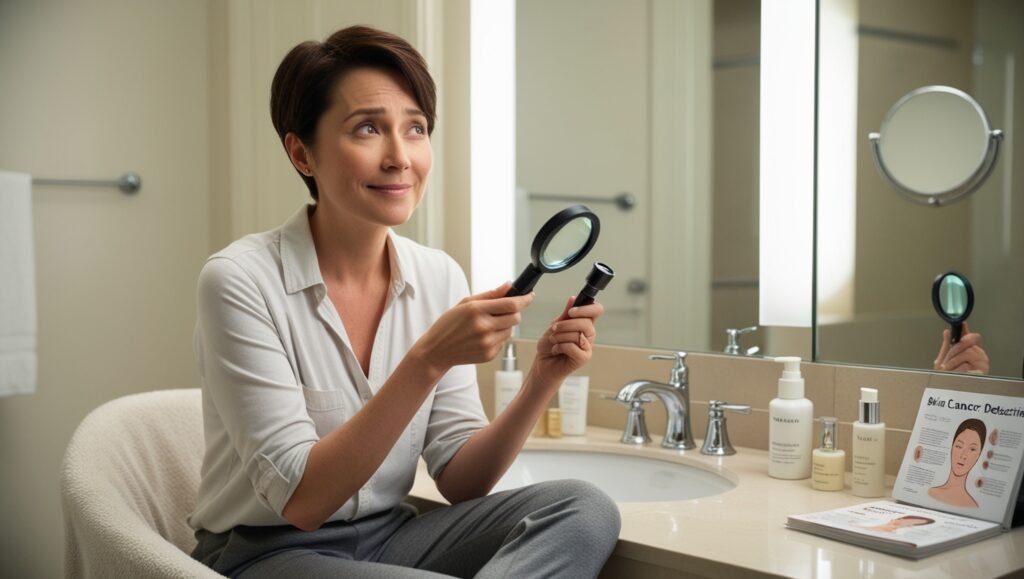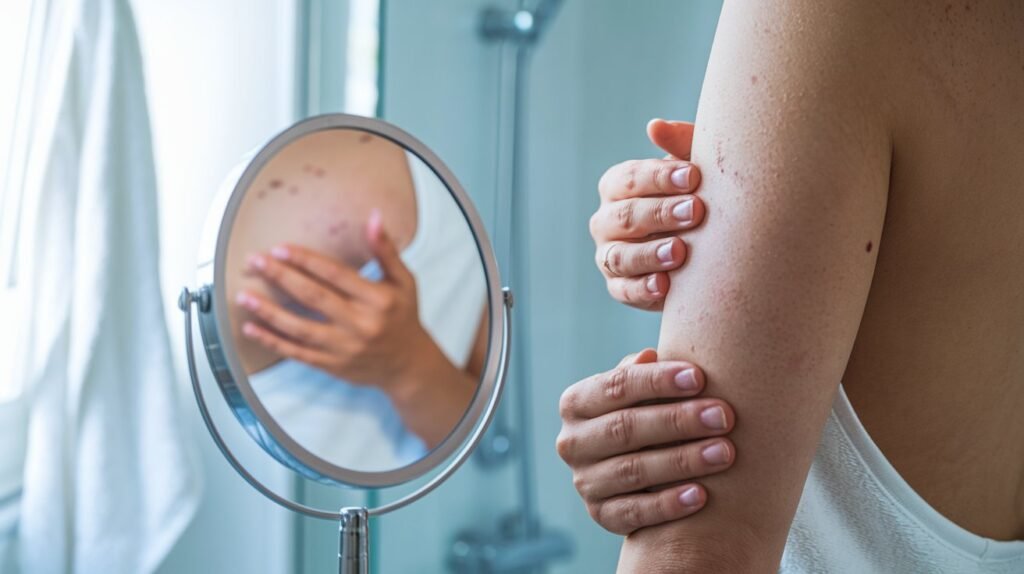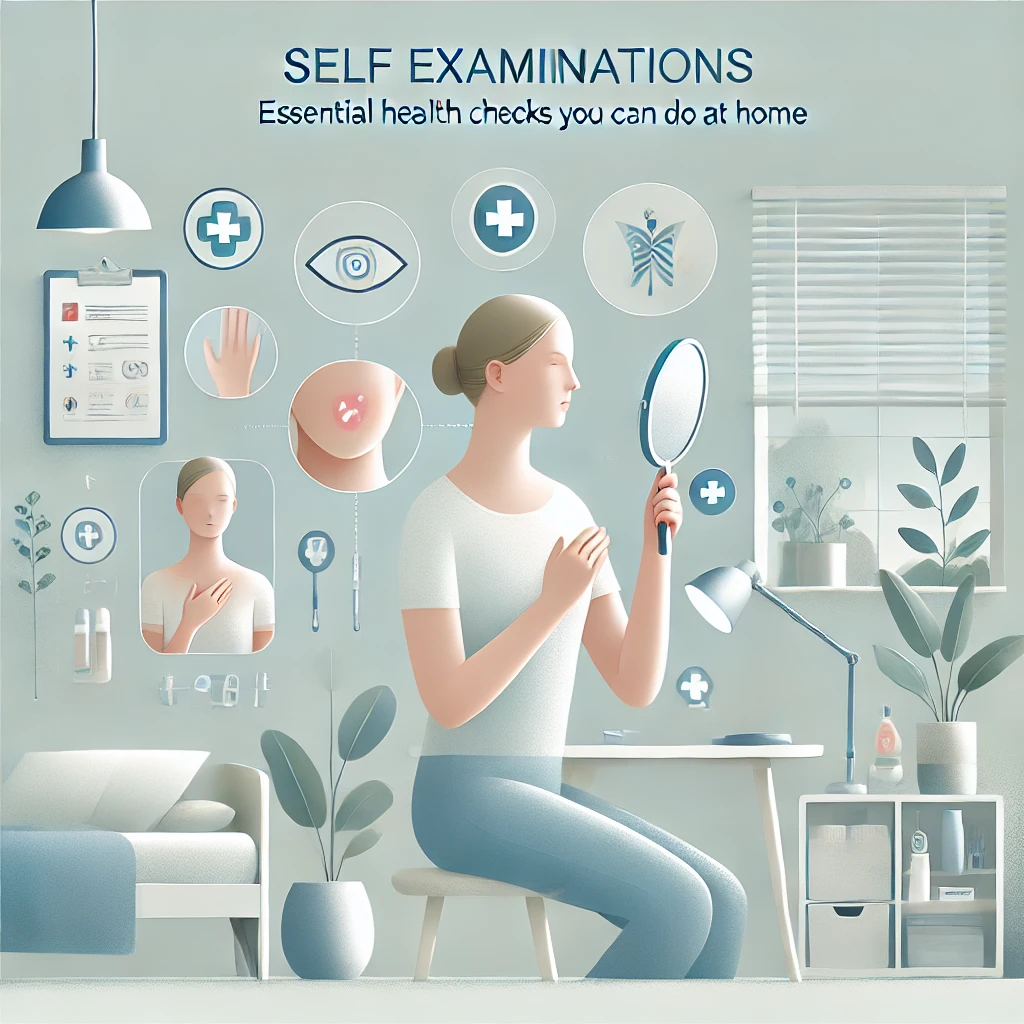Introduction
Have you ever stopped to consider how much you truly know about your own body and mind? In a world that constantly demands our attention, it’s easy to overlook the signals our bodies send us every day. Yet, these subtle signs can be the key to unlocking better health and well-being.
Self examinations are more than just a health buzzword—they’re vital for anyone who wants to take charge of their physical and mental well-being. From catching potential health concerns early to fostering a deeper understanding of yourself, self examinations empower you to stay proactive about your health.
But where do you start? And how can you make self examinations a seamless part of your life without feeling overwhelmed? In this blog, we’ll explore everything you need to know, from the types of self-checks to include in your routine to actionable steps you can take to perform them effectively. Let’s demystify self-examinations together and uncover how they can become one of the most empowering habits in your health journey.
Table of Contents
Self Examinations
Understanding the Importance of Self Examinations

When was the last time you checked in with your health—not during a doctor’s visit, but on your own? Self examinations are one of the simplest, yet most powerful, tools you can use to monitor your well-being. They’re more than just a routine; they’re a proactive step toward staying healthy and catching potential issues before they become bigger problems.
Why Are Self Examinations So Important?
Your body often gives you early warning signs when something isn’t right. The key is knowing how to recognize them. Self examinations help you:
- Catch health issues early: Many conditions, like skin cancer, breast cancer, and testicular abnormalities, are easier to treat when detected early.
- Stay in tune with your body: Regular self-checks help you notice subtle changes, whether it’s a lump, discoloration, or an unusual pain.
- Take control of your health: By performing self examinations, you’re actively participating in your well-being, making informed decisions rather than waiting for symptoms to worsen.
The Myths That Hold Us Back
Despite their importance, self examinations are often overlooked due to common misconceptions:
- “I’m too young to worry about this.” Many health conditions don’t discriminate by age. Early habits can lead to lifelong health benefits.
- “I don’t know what I’m looking for.” While this is a common concern, learning how to perform self-checks is easier than you think—and we’ll guide you through it.
- “If I find something, it’ll just make me anxious.” Knowledge is power. Identifying an issue early gives you the chance to act, often leading to better outcomes.
The Bigger Picture: Prevention is Better Than Cure
Self examinations aren’t just about looking for problems—they’re about creating a proactive health mindset. Combined with regular medical checkups, they form a robust health strategy that empowers you to take charge of your life.
By embracing self examinations, you’re not just addressing immediate concerns; you’re setting the foundation for long-term well-being. Isn’t your health worth that extra care?
Types of Self Examinations to Include in Your Routine
When it comes to self-care, self-examinations are among the most actionable ways to stay ahead of potential health issues. But with so many aspects of health to consider, where should you focus your attention? Let’s break down the essential types of self examinations that can help you take control of your well-being.
1. Physical Health Check-ins

Your body is constantly communicating with you. Regular physical self examinations can help you catch warning signs early. Here are a few to prioritize:
- Skin Checks: Look for new moles, changes in size or color, or unusual spots. Pay close attention to areas exposed to the sun. Use the ABCDE rule (Asymmetry, Border, Color, Diameter, Evolution) to assess potential skin cancer risks.
- Self-Breast Exams: Both men and women can benefit from this practice. Check for lumps, thickening, or changes in appearance. Doing this monthly makes it easier to recognize abnormalities.
- Testicular Self-Exams: A quick, monthly check can help you detect unusual lumps or swelling early. Best done after a warm shower when the skin is relaxed.
2. Mental Health Check-ins
Your mind deserves as much attention as your body. Regularly assess your emotional and mental state to ensure you’re maintaining balance. Ask yourself:
- Am I feeling unusually stressed or overwhelmed?
- Have I noticed changes in my sleep or energy levels?
- Is my mood affecting my relationships or daily activities?
Simple mindfulness practices, journaling, or speaking with a trusted friend or therapist can help address concerns before they escalate.
3. Lifestyle and Habit Reviews
Sometimes, it’s not just about what you find but also about how you’re living. Periodically reflect on your habits and lifestyle:
- Nutrition Check: Are you eating a balanced diet that fuels your body and mind?
- Activity Audit: Are you getting enough physical activity each week to keep your heart and body strong?
- Substance Awareness: Assess your use of alcohol, caffeine, or other substances to ensure it aligns with your health goals.
Why Routine Matters
Making self examinations a habit ensures you’re consistently aware of changes in your health. Consider:
- Setting reminders: Use apps or calendars to schedule monthly or quarterly check-ins.
- Tracking observations: Keep a journal or use notes on your phone to document any findings, no matter how small.
When you make self examinations part of your routine, you’re not just checking for issues—you’re actively investing in your health and future. Isn’t that a routine worth establishing?
How to Perform Self Examinations Effectively
Performing self examinations doesn’t have to be intimidating or time-consuming. With the right techniques, you can approach these checks confidently and ensure they become a seamless part of your routine. Let’s explore how to make your self examinations both effective and stress-free.
1. Set the Right Environment

Creating the right environment can make a big difference in how thorough and comfortable you feel during a self-examination:
- Choose a quiet, private space with good lighting.
- Use a mirror for a clear view, especially for skin or breast examinations.
- For physical self-checks, consider doing them after a warm shower when your skin and muscles are relaxed.
2. Learn the Steps for Common Self Examinations
Each type of self-examination requires a specific approach. Here’s a quick guide to some of the most important ones:
- Skin Checks: Stand in front of a mirror and inspect your entire body, including hard-to-see areas like your back and scalp. Use a handheld mirror if necessary. Look for unusual moles, spots, or changes in your skin’s texture.
- Breast Exams: Use your fingers to gently feel around the entire breast area in a circular motion, including under your arms. Look for lumps, thickened tissue, or changes in appearance. Perform this check once a month.
- Testicular Exams: Gently roll each testicle between your fingers, checking for lumps, swelling, or changes in size. This is best done once a month after a warm shower.
3. Use Tools and Resources
You don’t have to rely on memory alone. Leverage tools to make self-examinations easier and more accurate:
- Body charts: Mark any moles, freckles, or scars on a printable body map to track changes over time.
- Apps: Use health-tracking apps designed for self-examinations, which can set reminders and guide you through the steps.
- Videos or tutorials: Trusted medical websites often provide visual guides to ensure you’re following the correct procedures.
4. What to Look For
Knowing what’s normal for your body is essential. Pay attention to:
- Unusual lumps, bumps, or swelling.
- Changes in skin texture, color, or size of marks.
- Persistent pain or discomfort in specific areas.
When in doubt, consult a healthcare professional. Early detection saves lives, and it’s better to be proactive than to second-guess yourself.
5. Make It a Habit
The key to effective self examinations is consistency. Here’s how to ensure you stick with it:
- Set reminders: Add self-checks to your calendar, just like you would any other important appointment.
- Pair it with an existing routine: For example, check your skin while moisturizing or your testicles after a shower.
- Celebrate your efforts: Recognize that by prioritizing your health, you’re taking a powerful step toward a healthier future.
Final Thoughts
Performing self examinations doesn’t require medical expertise—just a willingness to know your body better and a commitment to your health. With these simple steps, you can feel confident in taking charge of your well-being and catching potential issues early. After all, your health is worth the time and effort!
Overcoming Barriers to Self Examinations
If self examinations are so beneficial, why do so many of us avoid them? For many, it’s not a lack of care but the presence of barriers—fear, time, or simply not knowing where to start. The good news? These obstacles are easier to overcome than you might think. Let’s tackle the most common barriers together and build your confidence in this essential health habit.
1. “What if I find something scary?”
The fear of uncovering a potential health issue is one of the biggest reasons people avoid self examinations. But think about it: early detection saves lives. Finding something unusual doesn’t mean it’s catastrophic—it simply means you can address it sooner, often with better outcomes.
Overcome it by:
- Reminding yourself that knowledge is power. Identifying changes early gives you control and options.
- Keeping a balanced perspective. Most findings during self examinations turn out to be harmless, but checking ensures peace of mind.
2. “I don’t know how to do it.”
Many people hesitate to start because they’re unsure of the proper techniques or what to look for. That’s perfectly normal—it’s a skill you can learn.
Overcome it by:
- Using resources like tutorials, medical websites, or apps that provide step-by-step instructions.
- Practicing regularly. The more you do it, the more familiar you’ll become with what’s normal for your body.
- Consulting your doctor for guidance during your next visit. They can show you the correct method and answer your questions.
3. “I don’t have the time.”
In a busy world, adding something new to your routine can feel overwhelming. But self examinations don’t need to take hours—they’re quick, easy, and can fit into your existing schedule.
Overcome it by:
- Pairing self-checks with daily habits, like checking your skin while applying lotion or doing a breast exam after a shower.
- Scheduling reminders. A few minutes once a month can make a lifetime of difference.
4. “It feels awkward or uncomfortable.”
It’s common to feel a little self-conscious about examining your body, especially for the first time. But remember, this is about taking care of yourself—there’s no reason for embarrassment.
Overcome it by:
- Focusing on the purpose. Think of self examinations as a form of self-respect and self-care.
- Practicing in private spaces where you feel safe and relaxed. Over time, the discomfort will fade.
5. “I forget to do it.”
Building a new habit takes time. It’s easy to let self examinations slip your mind when they’re not part of your routine yet.
Overcome it by:
- Linking self examinations to regular activities, like brushing your teeth or setting monthly reminders.
- Enlisting accountability. Share your goal with a friend or partner and encourage each other to stay consistent.
Turning Barriers into Stepping Stones
Every barrier to self examinations is an opportunity to learn and grow. By addressing these challenges head-on, you’re not only prioritizing your health but also building a habit that empowers you for life.
So, the next time you feel hesitant, ask yourself: what’s more important than taking care of yourself? A little effort today could make all the difference tomorrow.
Self Examinations as Part of a Proactive Health Strategy
When it comes to your health, waiting for symptoms to appear is no longer the best approach. Being proactive can make all the difference, and self examinations are a cornerstone of this strategy. They’re not just about identifying problems—they’re about fostering a mindset of awareness, prevention, and control over your well-being.
1. Why Proactive Health Matters
Think about it: most serious health conditions don’t develop overnight. They start with subtle signs—signs that you’re more likely to notice when you’re tuned in to your body. Proactive health strategies help you:
- Detect changes early, when they’re easier to address.
- Reduce anxiety by giving you a sense of control over your health.
- Build a stronger relationship with your healthcare provider through informed discussions.
2. Integrating Self Examinations with Regular Checkups
Self examinations are not a replacement for medical care but a powerful supplement to it. When paired with professional checkups, they create a comprehensive health strategy:
- Track changes over time: Use self-checks to monitor anything unusual and share these findings with your doctor during routine visits.
- Stay ahead of health issues: If you notice something new, you can address it before your next scheduled appointment.
- Collaborate with your doctor: Self-examinations give you valuable insights to discuss, enabling more personalized care.
3. Tools to Support Your Strategy
Building a proactive health routine doesn’t have to be complicated. Here are some tools and tips to keep you on track:
- Health journals: Keep a record of your self-check findings, noting any changes over time.
- Apps and reminders: Use technology to schedule regular self-examinations and track patterns.
- Education resources: Stay informed by reading reliable health information and updating your techniques as needed.
4. Beyond the Physical: A Holistic Approach
Proactive health isn’t just about spotting physical changes. It’s about creating a balanced lifestyle that supports your overall well-being:
- Mental health self-checks: Reflect on your stress levels, sleep quality, and emotional state regularly.
- Nutrition and fitness reviews: Are your habits supporting your goals, or do they need adjustments?
- Building support systems: Share your health journey with friends and family, creating accountability and encouragement.
5. Small Habits, Big Results
Incorporating self examinations into your proactive health plan doesn’t require major life changes. Instead, focus on small, consistent habits:
- Perform checks monthly or quarterly, depending on the type.
- Pair them with existing routines to make them easier to remember.
- Celebrate your progress and give yourself credit for prioritizing your health.
A Healthier Future Starts Today
By making self examinations part of your proactive health strategy, you’re investing in a longer, healthier, and more confident life. It’s about more than preventing illness—it’s about empowering yourself to take charge of your well-being.
Remember, the best health strategy is the one that works for you. Start small, stay consistent, and know that every step you take is a step toward a healthier future.
Conclusion
Your health is your greatest asset, and taking charge of it doesn’t have to be overwhelming. By incorporating self examinations into your routine, you’re doing more than just monitoring your well-being—you’re building a habit of self-awareness and proactive care.
Think about it: how often do you prioritize everything else over your health? Self examinations are a simple, effective way to put yourself first, even in a busy schedule. Whether it’s checking your skin for changes, reflecting on your mental health, or reassessing your lifestyle habits, every small effort adds up to a healthier, more empowered you.
So, what’s stopping you from starting today? With the knowledge and tools shared here, you now have everything you need to make self examinations a meaningful part of your health journey. Start by scheduling your first check—set a reminder, find a quiet moment, and begin. The confidence you’ll gain in understanding your body is worth every second.
And remember, self examinations aren’t just about finding issues; they’re about preventing problems, celebrating your health, and staying ahead of potential challenges. Combined with regular medical checkups and a proactive mindset, this habit can truly transform the way you approach your well-being.
Your health is in your hands—literally. So, why wait? Take the first step today and give yourself the gift of awareness, care, and a brighter, healthier future. You deserve it!
References
While I cannot directly provide references for the content generated, here are some reliable sources you can explore for more information about self-examinations and proactive health strategies:
- Mayo Clinic
- Website: www.mayoclinic.org
- Offers expert advice on health checkups and self-examinations, including step-by-step guides.
- American Cancer Society
- Website: www.cancer.org
- Provides detailed information on self-exams for cancer prevention, including breast and testicular self-examinations.
- National Institutes of Health (NIH)
- Website: www.nih.gov
- A comprehensive resource for information on health monitoring and preventive care.
- Cleveland Clinic
- Website: www.clevelandclinic.org
- Guides on self-care, including tips for integrating self-examinations into a proactive health plan.
- Dermatology Foundation
- Website: www.dermatologyfoundation.org
- Focuses on skin health and offers resources on skin self-examinations.
- Mental Health America (MHA)
- Website: www.mhanational.org
- Discusses mental health self-check-ins and ways to assess your emotional well-being.



